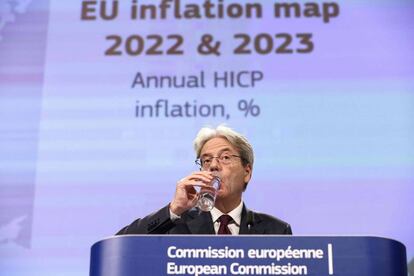Fears of recession in Europe subside as gas prices provide respite from energy crisis
The fall in energy costs and China’s reopening have dispelled fears of an economic slump in the European Union but analysts predict a stagnant economy in 2023


Europe has breathed a collective sigh of relief as falling gas prices and a mild winter so far have provided respite from the energy crisis. And as much of what has been taking place in economic terms in recent months can be explained by fluctuations in the fuel markets, the gloomy forecasts of a few months ago have been steadily improving in recent weeks, as have statements by political leaders and financial analysts. “I’m absolutely convinced that this will not happen that we are going into a recession,” German Chancellor Olaf Scholz told Bloomberg on Tuesday. “The contraction of economic activity at the turn of the year may not be as steep as we projected before,” European Union Commissioner for Trade Valdis Dombrovskis added on Wednesday.
At the outset of the last quarter of the year, few doubted that the European Union would suffer a recession this winter. Russia’s invasion of Ukraine had pushed up energy prices and thus also inflation. Europe’s fate appeared clear in the eyes of analysts and the institutions. Optimism had once again given way to pessimism. Forecasts predicted at least two consecutive quarters of contraction: a technical recession. At that time, a megawatt hour (MWh) of gas on the Dutch TTF market, the European benchmark, was fetching around €200. It was also feared that low temperatures would force heating systems to operate at maximum capacity, causing reserves to drop rapidly. The specter of rationing was even feared.
However, gas prices have fallen. On Monday, MWh was priced at €55. And for now, the European winter has not been severe. As such, the EU’s gas storage tanks are almost full, at 81% of capacity. In Germany reserves stand at almost 90%, which may explain Scholz’s optimism, given that gas is hugely important to German industry, the country’s economic engine.
“The mild winter weather has had a very significant impact on the economy. Storage tank levels remain above expectations, which has led to a noticeable drop in the price of natural gas. That helps production for industry to run better, but it also eases inflationary pressures for the time being […] It sounds silly, but at the moment the effects of the weather are very important for the eurozone economy,” Bert Colijn, an economist at Dutch bank ING’s eurozone research department, told EL PAÍS via e-mail.
“The energy component is the most important factor. Severe recession could result in rationing scenarios,” said Ángel Talavera of Oxford Economics. “We are going to see an improvement in forecasts in the next revisions,” he added. However, neither Talavera nor Colijn expect strong growth in 2023: Talavera estimates that the eurozone will grow by just 0.5%, which represents a stagnant economy.
The data to hand is still very preliminary, but the figures already point in that direction. The economic sentiment indicators compiled by the European Directorate-General for Economic and Financial Affairs rebounded by almost three points from October to December, to 94.2, although anything below 100 is still a symptom of weakness. Another positive surprise was the slight upturn in industrial activity in November in both the EU and the eurozone. Inflation has also been losing steam for two months. And, once again, the labor market has shown a resilience that few anticipated: the 6.5% unemployment rate calculated for the single currency zone in November, and 6% across the EU as a whole, are in the region of historic lows.
To these early and partial indicators must be added the first estimate on the performance of the German economy in 2022. Last week, the German statistics office Destatis calculated growth of 1.9% last year. That figure refers to the year as a whole, but marks an improvement on earlier forecasts for 2022 in the EU’s leading economy.
Goldman Sachs believes the determining factors in this shift are energy and the end of China’s zero-Covid policy, and raised its estimates for 2023 from a 0.1% decline to 0.6% growth. “We maintain our view that Euro area growth will be weak over the winter months given the energy crisis but no longer look for a technical recession,” Goldman Sachs economists said in a statement.
“I think there could be a very mild technical recession, but at this point we’re talking semantics,” said Colijn. “We don’t expect a significant increase in unemployment, as labor shortages will cause companies to hoard workers as the economy weakens. So, it’s likely that, if the economy contracts for two quarters in a row, it won’t be perceived as a dramatic period for the economy.”
Whether or not there is a recession in Europe is something that will be decided by one tenth of a percentage point, give or take. But at this point, economists no longer view it as something substantial. Talavera, though, does point to an element of uncertainty: “I am concerned about the delayed effect of the interest rate hike. We have to keep an eye on it.”
Sign up for our weekly newsletter to get more English-language news coverage from EL PAÍS USA Edition
Tu suscripción se está usando en otro dispositivo
¿Quieres añadir otro usuario a tu suscripción?
Si continúas leyendo en este dispositivo, no se podrá leer en el otro.
FlechaTu suscripción se está usando en otro dispositivo y solo puedes acceder a EL PAÍS desde un dispositivo a la vez.
Si quieres compartir tu cuenta, cambia tu suscripción a la modalidad Premium, así podrás añadir otro usuario. Cada uno accederá con su propia cuenta de email, lo que os permitirá personalizar vuestra experiencia en EL PAÍS.
¿Tienes una suscripción de empresa? Accede aquí para contratar más cuentas.
En el caso de no saber quién está usando tu cuenta, te recomendamos cambiar tu contraseña aquí.
Si decides continuar compartiendo tu cuenta, este mensaje se mostrará en tu dispositivo y en el de la otra persona que está usando tu cuenta de forma indefinida, afectando a tu experiencia de lectura. Puedes consultar aquí los términos y condiciones de la suscripción digital.








































